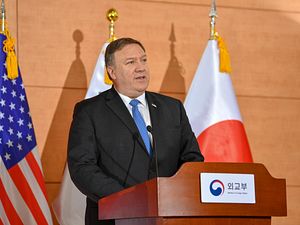The body language between Prime Minister Shinzo Abe and President Moon Jae-in said it all. Instead of using the G-20 summit meeting in Osaka in late June as an opportunity for the leaders of Japan and South Korea to engage even as relations remained terse, optics from the conference showed just how deep the rift between Tokyo and Seoul had become. The two men studiously avoided one another throughout the very public forum, and no bilateral meeting was held on the sidelines.
In that light, Japan’s latest decision to impose export restrictions on South Korea targeting its technology sector is both surprising and expected in light of mounting frustrations between the two countries. Still, given that the trade friction is a symptom rather than a cause of the deep-rooted bilateral dispute, simply seeking to resolve the export restrictions would be only a temporary solution to a far bigger issue.
The implications of Japan’s decision to restrict exports of three key specialized materials — namely fluorinated polyimide, resist polymers, and hydrogen fluoride, which are prerequisites for producing semiconductors and computer displays — have rattled Korean technology giants including Samsung and LG. Given that a quarter of South Korea’s export economy depends on chip production, the inability to source materials would be a tremendous blow for the country at large. It will also hurt major users of South Korean chips, including U.S. giants such as Apple and Dell. While Washington’s instinctive reaction is rightly to stay on the sidelines and certainly not take sides, there is growing concern among U.S. tech companies that the longer the dispute goes on, the more it will hurt the U.S. economy too. Resolving the export restriction issue swiftly is clearly is in the United States’ own national interest as well. Hence the willingness now for the State Department as well as the White House to take on a more active role as mediator.
In the near term, the prospect of Washington playing the role of honest broker to encourage the two sides to resume discussions and reach some kind of deal would be a win not just for the United States, but for Japan and South Korea as well. Arguing that Washington was insistent on its two key regional allies’ reaching a compromise deal would no doubt save face for both Abe and Moon. Yet the “Washington made me do it” approach to a resolution would only be a temporary fix to a deep-rooted conflict that has played up nationalist sentiment on both sides.
For Japan, the decision to impose export restrictions is a manifestation of its frustration with South Korea’s actions, which Tokyo believes go against the 1965 peace treaty signed between the two countries. That treaty included financial compensation as well as a formal apology as steps to resume diplomatic relations and, in Japan’s interpretation, thus settled historical issues once and for all. South Korea’s decision to pull out of the 2015 accord to end debate about the violence against “comfort women” forced into prostitution under Japanese occupation, and the South Korean supreme Court’s ruling granting compensation for workers under Japanese occupation are among some of the issues that have triggered Tokyo to take action against what it sees as Seoul continuing to renege on previously agreed deals.
While Tokyo’s frustration against South Korea may not be without reason, its decision to impose export restrictions as a deliberate ploy to cripple Korea’s economic engine goes directly against what Abe has carefully been cultivating over the past two years — namely an image as a leader of free markets and a strong advocate of multilateralism. The Abe government has succeeded in pushing through the ambitious Trans-Pacific Partnership agreement even after the United States abruptly pulled out in 2017, and the reworked CPTPP has been an opportunity for Japan to demonstrate its leadership role as a proponent of adhering to the rule of law and transparency. The latest action against South Korea puts a dent in that narrative at a time when Tokyo needs to enhance its ability to rally like-minded countries. The need to strengthen relations between nations that share a commitment to the rule of law, privacy protection, and individual rights is particularly needed to offset China’s vision for Asia, which would be defined by Beijing’s authoritarian values.
The need for Japan and South Korea to resolve the export restriction dispute is clear. Yet tackling the trade issue alone, as Washington is trying to do, is merely addressing one symptom of long-festering tensions. With unbridled nationalism as the root cause of the ongoing tensions, it will take unwavering commitment to focus on cooperation rather than competition on both sides to make a breakthrough. It may well be that nothing short of a leadership change in both Tokyo and Seoul will allow that kind of political will to emerge.
Shihoko Goto is Deputy Director for Geoeconomics at the Asia Program, Woodrow Wilson Center, Washington DC.

































